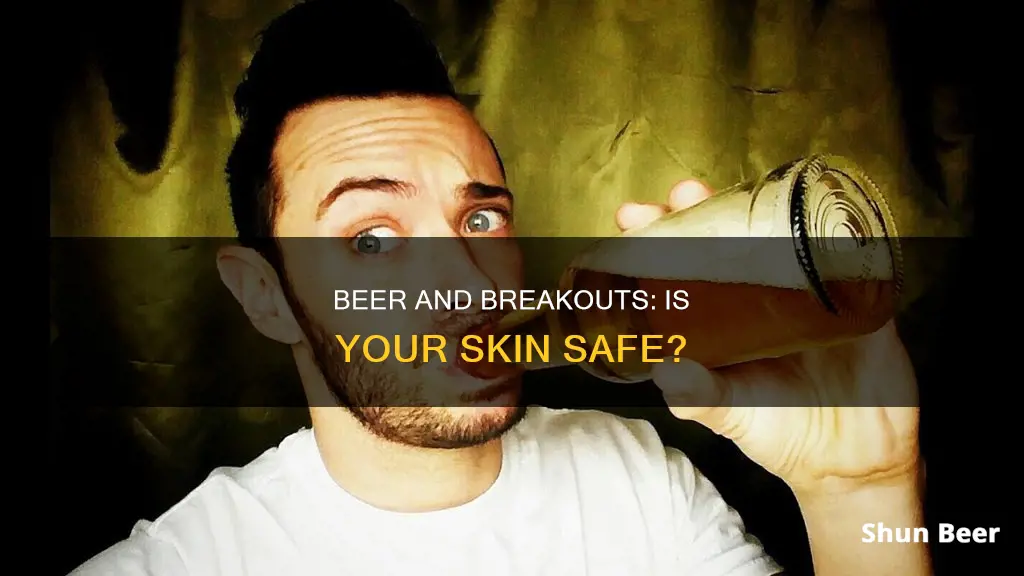
Alcohol does not directly cause acne, but it can affect the body in ways that may indirectly cause or worsen breakouts. Alcohol can dehydrate the body, causing the skin to produce more oil and become more prone to acne. It can also affect the immune system, making the body more susceptible to infections and inflammation, which are common causes of acne. Additionally, alcohol can influence hormone levels, which can further impact the development of acne. Different types of alcohol can have varying effects on the skin, with dark liquors and mixed drinks being particularly harmful due to their high sugar content and potential for causing inflammation and dehydration. While alcohol may not be the sole cause of acne, limiting or avoiding its consumption can help improve skin health and reduce the likelihood of breakouts.
| Characteristics | Values |
|---|---|
| Direct link between drinking beer and acne | No direct link |
| Indirect link between drinking beer and acne | Yes |
| How does drinking beer indirectly cause acne? | By affecting bodily systems such as hormone levels, the immune system, and the liver |
| How does drinking beer affect hormone levels? | By increasing testosterone levels in men and estradiol levels in women |
| How does drinking beer affect the immune system? | By decreasing the number of protective cells in the body |
| How does drinking beer affect the liver? | By overwhelming it and preventing it from effectively removing toxins |
What You'll Learn
- Alcohol is a diuretic, which causes dehydration and can lead to acne breakouts
- Alcohol can cause a hormonal imbalance, which may trigger a breakout
- Alcohol can weaken the immune system, making the body more susceptible to infections
- Alcohol can cause inflammation, which is a primary cause of acne
- Excessive drinking, stress, improper sleep and neglecting skincare can contribute to acne breakouts

Alcohol is a diuretic, which causes dehydration and can lead to acne breakouts
Alcohol is a diuretic, which means it increases urine production, flushing out excess water and salt. This diuretic function will eventually leave you and your skin dehydrated. When your skin is dehydrated, your body's oil glands will produce more oil to compensate for the loss of water. This excess oil can then clog your pores and lead to acne breakouts.
Drinking enough water is the best way to stay hydrated and prevent acne breakouts. If you are drinking alcohol, it is recommended to have a glass of water in between each alcoholic drink.
In addition to dehydration, alcohol can also affect your body in other ways that may indirectly cause or worsen acne. For example, alcohol can affect your hormone levels, leading to increased oil production and potentially causing acne breakouts. Alcohol can also weaken your immune system, making you more susceptible to infections such as Propionibacterium acnes (P. acnes) bacteria, which is a common cause of acne.
While alcohol does not directly cause acne, it can contribute to other factors that can trigger breakouts, such as inflammation and hormone imbalances. Therefore, if you are prone to acne, it is best to limit your alcohol consumption.
Vaccine and Beer: What's Safe to Drink?
You may want to see also

Alcohol can cause a hormonal imbalance, which may trigger a breakout
Alcohol can indeed cause a hormonal imbalance, which may trigger a breakout.
Alcohol is known to affect the levels of hormones such as testosterone and estradiol (a form of estrogen). For instance, a study found that a small amount of alcohol could increase testosterone levels in men. Another study found that alcohol could increase testosterone and estradiol levels in women.
Increased hormone levels can stimulate the oil glands in your skin, leading to excess oil or sebum production. This, in turn, can clog your pores and result in a breakout.
Additionally, alcohol is often consumed in the form of sugary drinks, which can cause your blood sugar levels to spike. This can set off a chain reaction that may also result in an acne breakout.
While alcohol does not directly cause acne, its impact on hormone levels and blood sugar can indirectly contribute to breakouts.
Beer and Army Uniforms: What's the Official Stance?
You may want to see also

Alcohol can weaken the immune system, making the body more susceptible to infections
Alcohol can negatively impact the immune system, making the body more susceptible to infections. Experts believe that alcohol may lessen the function of the immune system, and even moderate amounts of alcohol may alter a person's immune response. Alcohol can destroy protective cells in the body, making it difficult for the body to combat harmful bacteria and viruses. This may increase the likelihood of infections, such as Propionibacterium acnes (P. acnes) bacteria, which are known to cause cysts and pustules.
Research has shown that alcohol abuse can interfere with the long-term functioning of the immune system, making individuals more susceptible to infections. For example, alcohol abuse can lead to alcoholic lung, where it weakens the immune system, damages the surface cells of the lungs, and harms the cilia that help remove foreign particles. This can result in a syndrome called alcoholic lung, which can develop in as little as six weeks.
Additionally, alcohol abuse can also cause internal bleeding in the gastrointestinal tract, impair nutrient absorption, and worsen symptoms of irritable bowel syndrome (IBS). Chronic alcohol abuse can further exacerbate these issues. Therefore, it is crucial to stay hydrated when consuming alcohol to avoid bowel-related complications.
Beer and Loratadine: Safe Mix or Health Risk?
You may want to see also

Alcohol can cause inflammation, which is a primary cause of acne
Inflammation, clogged pores, and bacteria are among the factors that can contribute to the development of acne. Alcohol does not directly cause acne, but it affects the body in ways that may indirectly cause or worsen this skin issue.
Alcohol is a diuretic, which means it increases urine production, flushing out excess water and salt. This process can leave the skin dehydrated. When the skin is dehydrated, the body's oil glands may produce more oil to compensate for the water loss, making the skin more prone to acne breakouts.
In addition, alcohol can cause a spike in insulin levels, which can lead to increased oil production and clogged pores. Alcohol is also high in sugar, which is known to trigger inflammation. This can further increase the likelihood of acne breakouts.
The link between alcohol consumption and acne is particularly relevant for people who already have acne-prone skin. For those concerned about the effects of alcohol on their skin, limiting or avoiding alcoholic beverages may be advisable.
Different types of alcohol can have varying effects on the skin. For example, red wine can cause inflammation due to its high tannin content, while clear liquors like vodka and gin are less likely to cause hangovers and may cause less inflammation. However, all types of alcohol can contribute to dehydration and inflammation to some degree.
While alcohol is not the sole cause of acne, its consumption can trigger or aggravate breakouts by causing inflammation and hormonal imbalances.
Beer and Stroke Recovery: What You Need to Know
You may want to see also

Excessive drinking, stress, improper sleep and neglecting skincare can contribute to acne breakouts
Excessive drinking can dehydrate your skin and body. Alcohol is a diuretic, which means it increases urine production, flushing out excess water and salt. This can leave your skin dehydrated, prompting your oil glands to produce more oil to compensate for the loss of water. Excess oil can increase your risk of breakouts.
Stress can also be a reason behind excessive drinking. Alcohol can also affect your body's systems and, in turn, influence your skin's health. Drinking excessively can cause a hormonal imbalance, which can lead to a breakout. Alcohol can affect testosterone levels, which can directly result in acne breakouts. It can also increase estradiol levels, a form of estrogen, which can stimulate your oil glands. Increased oil production can clog your pores and result in a breakout.
Improper sleep and neglecting skincare can also contribute to acne breakouts. Getting a good night's sleep is crucial to giving your skin time to rest and rejuvenate. Maintaining a consistent skincare routine is key to having healthy, clear skin.
Beer and Zyrtec: A Safe Mix?
You may want to see also
Frequently asked questions
Drinking beer does not directly cause acne. However, it can lead to dehydration, which may cause acne breakouts. Beer also contains sugar, which can cause a spike in insulin levels, resulting in breakouts.
Alcohol affects the skin by causing dehydration, which can lead to increased oil production and clogged pores. It can also trigger skin conditions such as acne, psoriasis, and rosacea.
Alcohol can affect the body by altering hormone levels, reducing immune function, and causing liver damage. It can also contribute to inflammation and blood sugar spikes, which may indirectly lead to acne breakouts.
To reduce the impact of alcohol on your skin, it is recommended to drink in moderation and stay hydrated by drinking water between alcoholic beverages. Maintaining a consistent skincare routine and getting adequate sleep can also help manage acne flare-ups.
Quitting alcohol can have positive effects on skin health. Within a week, you may notice improvements in skin hydration and a reduction in inflammation. After a month, your skin may appear healthier and more even-toned.







